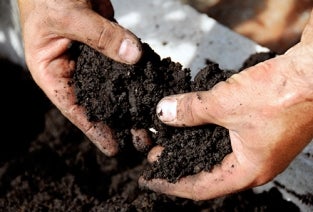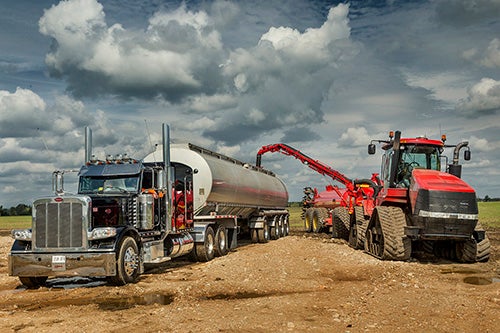
Waste not, want not
Biosolids company with Waterloo link pushes re-use over bury and forget

Biosolids company with Waterloo link pushes re-use over bury and forget
By Christian Aagaard Marketing and Strategic CommunicationsSince his retirement in 2013 from the Biology Department at the University of Waterloo, Owen Ward, professor emeritus in the Faculty of Science, has lost none of his passion for turning things people don’t want into things they do.
He has his own laboratory in Waterloo and throws the same urgent energy into Lystek International Inc., the company he started in 2000 to make better use of sewage sludge.
The term biosolids refers to the gelatinous residue from treating waste water.
Farmers spread some of it on fields, but most of the material ends up de-watered, compacted and buried in landfill sites.

“We look at the big picture,” Ward says of Lystek’s alternative re-use model. “We’re drawing down the use of chemical fertilizers. If biosolids go to landfill the chemical fertilizers that went into the food that created those biosolids is also wasted.
“Returning those nutrients to the soil is the only way to have a sustainable food system.”
Lystek’s process — a combination of heat, added alkali and high-speed stirring (or “shearing”) — dramatically changes the characteristics of the material and kills the pathogens that cause much of the concern around spreading partially treated biosolids on fields. The resulting product is LysteGro, a quality-controlled, federally- registered, (CFIA) liquid fertilizer that retains the valuable organics and nutrients in biosolids but that can still be applied by the same methods.
The company has several installations in Ontario. Its largest, a processing plant in Dundalk, produces 1,000 cubic metres of fertilizer a day from biosolids hauled from as far away as Toronto.
“We can’t keep up with the demand,’’ Kevin Litwiller, Lystek’s director of business development, says of the interest farmers have shown for the product.

The same system can also be used to improve the operational efficiencies at wastewater treatment plants. When a small amount of “LysteMized” material is looped back into digesters, it results in significant increases in biogas production for green energy while reducing volumes of biosolid output.
Ward brought his background in industrial processes and microbiology to Waterloo in 1986, on sabbatical. He stayed, he says, because of Waterloo’s intelectual-property policies — you create it, you own it.
As of October 2014, Lystek employed 11 in Dundalk and eight at its Cambridge headquarters. Besides injecting millions into the local economy and paying property taxes, the Dundalk plant helps keep graduates from post-secondary schools in a rural community, Ward says. Many of the employees have degrees or diplomas. The company also employs co-op students.
“For me, as a researcher, the most satisfying thing is to see your ideas play out in the real world,” he says.

Read more
New platform helps pharmacists prescribe with confidence, streamline administrative tasks and improve patient outcomes

Read more
New medical device removes the guesswork from concussion screening in contact sports using only saliva

Read more
Here are the people and events behind some of this year’s most compelling Waterloo stories
The University of Waterloo acknowledges that much of our work takes place on the traditional territory of the Neutral, Anishinaabeg, and Haudenosaunee peoples. Our main campus is situated on the Haldimand Tract, the land granted to the Six Nations that includes six miles on each side of the Grand River. Our active work toward reconciliation takes place across our campuses through research, learning, teaching, and community building, and is co-ordinated within the Office of Indigenous Relations.